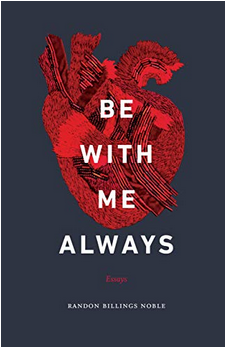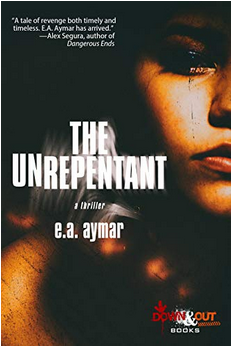Book Reviews: BE WITH ME ALWAYS and THE UNREPENTANT
We are in the heart of summer, which has always been prime reading time. What else is a lazy summer day made for, if not lounging with a good book, perhaps in between a splash in the pool and a quick nap? Here are two recent reads that I’m recommending you tuck into your beach bag: a debut essay collection and a thriller with heart and compelling characters. They could not be more different from each other, and I found them both compulsively readable.
BE WITH ME ALWAYS: ESSAYS
Randon Billings Noble
University of Nebraska Press

The cover of this debut collection of essays is arresting: it features an image of a heart that’s constructed of a lovely combination of deep red embroidery and beading. But it’s not the stylized heart of a Valentine; it’s a human heart, much as you’d find if you cut open your chest, complete with part of the aorta and pulmonary artery.
That image helps to convey some of the author’s sensibility, which is that of a clear-eyed pragmatist wrestling with a romantic. In “A Pill to Cure Love,” author Randon Billings Noble dissects the chemical composition of Tylenol—vinegar, ammonia, and tar—to consider whether that will do the trick. She tracks the end of a serious affair against the relationship between Henry VIII and Anne Boleyn.
In “Assemblage,” she discusses the story of Frankenstein along side the story of her pregnancy with twins, and interjects the origins of selected words, such as incarnate. She notes crisply, “There’s always a little carnage in creation.”
Noble plays with words and their meanings throughout her essays, fascinated by the evolution in meaning, use, and nuance. In “Widow Fantasies,” we learn that “[t]he Russian word for solitude means ‘being with everybody’”, and that fantasy is from the Greek meaning literally “a making visible.” The essay “Camouflet” wends its way through a discussion of being en flanant—strolling anonymously through city streets, aimless but observant—to explaining this French slang term, the origin of camouflage, as meaning “a whiff of smoke in the face.”
Literature also plays a significant role in Noble’s essays. In “Striking,” she counts off twenty observations of herself in relation to Wuthering Heights, noting, “There are twenty matches in a book,” and the reader can practically hear her striking each one and letting it burn down. In “69 Inches of Thread, Scarlet and Otherwise,” she uses connections among Sherlock Holmes, word origins, and her own experience to stitch together ways of finding and revealing truth.
As to revealing truths, she does not shy away from sharing raw and sometimes surprising stories. I believe that many expectant mothers feel some level of dread at what is transpiring and yet to come, but are reluctant—for obvious reasons—to share those thoughts. Here, Noble tells us, “the weight of what I am carrying presses me down and down . . . I fear that they will eat me up. I fear that my life is already over.” And in the era of #MeToo, Noble, rather than having an ugly tale to tell of being wrestled into submission, confesses to regretting ducking out of the embrace of a high school boy who had plans for her on a pool table.
Essays are the non-fiction equivalent of short stories, which may explain their current popularity in our time-pressed lives. Each essay here stands on its own, so you can enjoy one whenever you have a few moments, but taken together, the collection builds layers of depth and perspective that make the sum greater than the parts. You’ll want these essays to be with you always—at least until you finish reading every one.
THE UNREPENTANT
E. A. Aymar
Down & Out Books

I’ll admit to feeling a level of concern when I heard that author E. A. Aymar was researching sex trafficking for an upcoming novel. The last thing we need, I thought at the time, is another book that lovingly details the torture and sexual abuse of women, seemingly inviting the reader to enjoy the experience along with the perpetrator. (This is exactly the reason I stopped watching Criminal Minds around Season 3.)
Thus, I’m relieved to say that Aymar has done an admirable job of avoiding that trap with The Unrepentant, handling a difficult subject with sensitivity while delivering a taut, character-driven thriller.
Army vet Mace Peterson is stumbling through the nighttime Baltimore woods after an argument with his lawyer ex-wife, Eve, when he comes upon 18-year-old Charlotte Reyes, bound at the wrists and being pulled out of the trunk of a car by two men, one carrying an ax. After Mace crashes in to break up the impending murder, Charlotte takes the lead in getting the two of them out of the immediate jam.
Thus begins a classic cat and mouse chase story, with the good guys running and the bad guys forever closing in, mixed in with a solid revenge tale worthy of any of the Death Wish movies. The abuse that Charlotte has suffered at the hands of these men — and those before them — drives her desire for vengeance, and, on the surface at least, leaves her unrepentant.
Mace serves as a contrast to Charlotte; he is haunted by the memory of the one Iraqi he killed, even though his actions saved American lives. He believes that there is something inherently wrong with the use of lethal force.
Charlotte — or Carlota, as she was to her Mexican mother, in her previous, happier life in California — collects a supporting team that includes both Mace and Eve, who needs to be convinced not to involve the police, and Dory, a woman who has dedicated her life to helping victims of abuse, particularly sex trafficking.
On the side of the bad guys, there are the four who were holding Charlotte chained in a Baltimore basement — one a cop who was among the three taking nightly turns raping her — the two assigned to eliminate her when she started fighting back, and the one who employs them all, Barnes, whose brutality is as dispassionate as it is boundless.
I read this entire novel in one long sitting. The chapters are short, sometimes less than a page, to shift among the different characters and locales. Aymar’s pacing alternates between adrenaline-pumping chase and fight scenes, and quieter moments that give the reader time to take a breath, and to give the characters time to develop. Particularly effective is having Charlotte tell her own story to Mace, Eve, and Dory, and she is matter-of-fact in her account.
Well-selected details add depth to the story. For example, we learn that both Charlotte and Eve’s mothers worked in libraries, and both women grew up knowing the love of a committed parent. It helps to underscore the vagaries of fate and simple bad luck that place Charlotte in Barnes’ path; there but for the grace of God . . .
Given the current headlines about wealthy sex traffickers being protected by a legal system that dismisses or ignores the victims, Unrepentant helps to paint an unflinching portrait of what many continue to think of as a victimless crime. Pretty Woman this is not.
Aymar has provided a compelling hero in Charlotte, a young woman who, through no fault of her own, has everything taken from her. She makes us wonder the extent that we — in her place — would find ourselves equally unrepentant.
Jennifer Bort Yacovissi
Jenny Yacovissi grew up in Bethesda, Maryland, just a bit farther up the hill from Washington, D.C. Her debut novel Up the Hill to Home is a fictionalized account of her mother’s family in Washington from the Civil War to the Great Depression. In addition to writing historical and contemporary literary fiction, Jenny reviews regularly for the Washington Independent Review of Books and the Historical Novel Society. She belongs to the National Book Critic’s Circle and PEN/America. She also owns a small project management and engineering consulting firm, and enjoys gardening and being on the water. Jenny lives with her husband Jim in Crownsville, Maryland. To learn more about the families in Up the Hill to Home and see photos and artifacts from their lives, visit http://www.jbyacovissi.com/about-the-book.
- Web |
- More Posts(33)